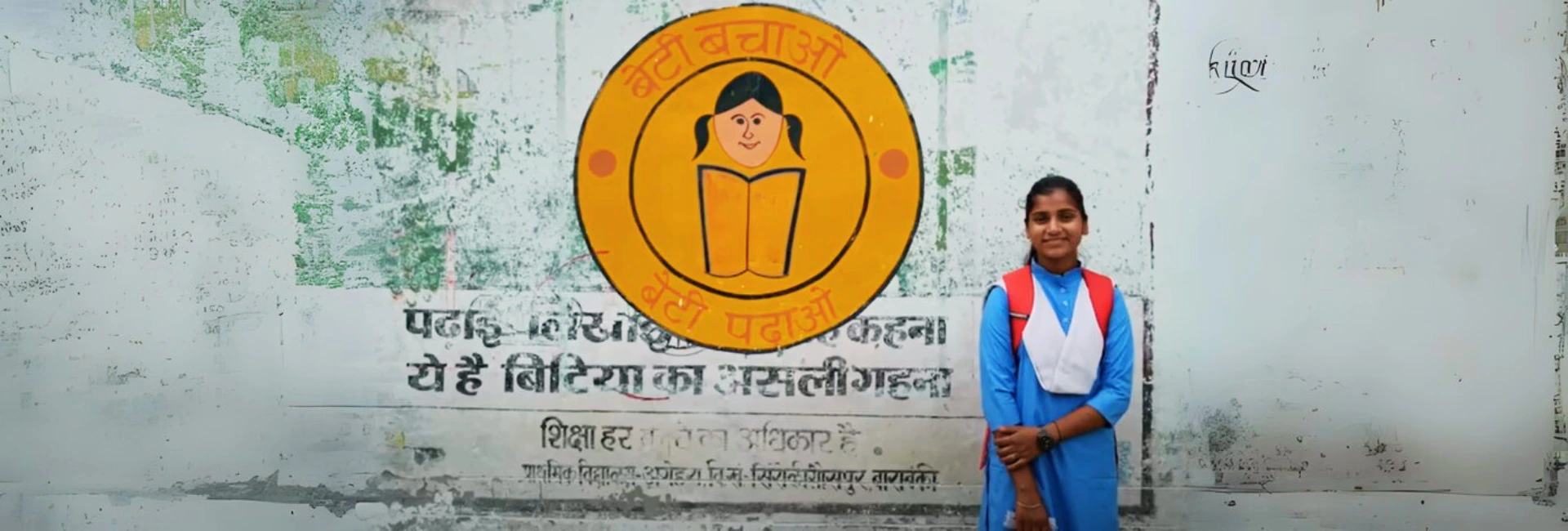(July 28, 2025) “I never thought I’d even reach Barabanki,” says 17-year-old Pooja Pal in a recent BBC interview. But life had other plans for her. The sharp young mind from a mud-walled home in a remote village of Barabanki district in Uttar Pradesh has just returned from Japan where she represented India as one of the country’s brightest science students, and the only participant from her state in a prestigious international science exchange.
It all began with a troubling observation, and one question, “Can I stop the dust that’s hurting our people?”
The village girl who grew up without electricity, toilets, or a support system, built a dust-free thresher to protect rural communities. In doing so, she is on the path of changing not just her surroundings but the course of her own life.
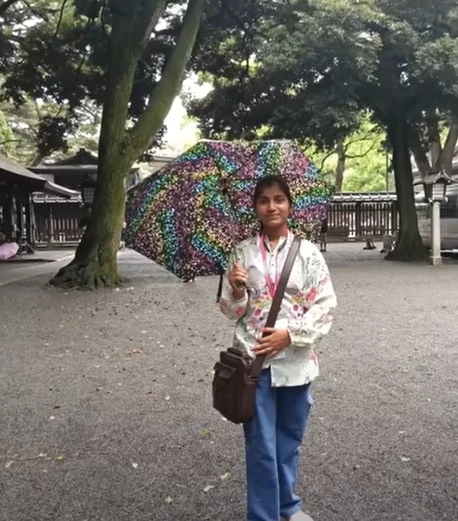
Pooja in Japan | Image Credit: BBC
A childhood lit by firelight and dreams
Pooja is one of five children in a seven-member family where survival often came before ambition. Her father, Puttilal, is a daily-wage labourer and her mother, Sunila Devi, cooks mid-day meals at a local government school. Their home is a fragile structure of mud and thatch. For years, there was no electricity.
“I used to study by a kerosene lamp,” Pooja recalls. “Later, we used a bulb lit through a battery. My parents always said, ‘We’ll eat less, but you all must study as that will take you ahead.’” That advise has always stayed with the youngster.
The moment that sparked innovation
In class eight, Pooja noticed that children in her school coughed violently due to the dust from a nearby threshing machine. The air was thick with fine chaff particles which is a common but dangerous by-product of grain threshing in agricultural areas. In rural India, exposure to this dust can lead to chronic coughing, breathing issues, allergies, and respiratory infections, especially among children and farm workers.
“That dust just stuck in my mind. It wasn’t right,” she says. “I asked myself, can we do something about this?”
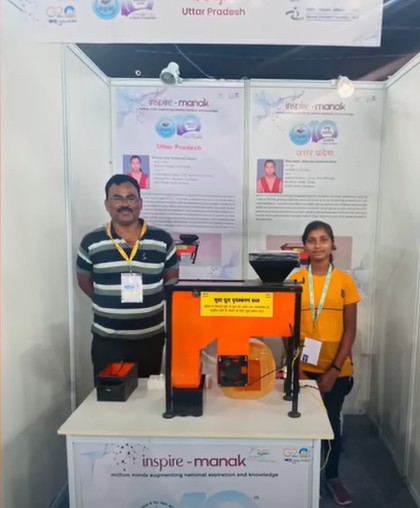

Pooja and her teacher with the innovative product | Image Credit: BBC
Determined to act, she began building a model with the help of a welder and under the guidance of her school teacher. After multiple trials and errors, she created a dust-free thresher which is a small but effective machine that traps the flying husk particles in a water container inside the machine, instead of releasing them into the air. It has been a safer, cleaner solution that benefits both farmers’ health and the environment.
Her innovation cost her family ₹3000, which was a heavy expense for them. But Pooja didn’t let go of her vision. “People in the village mocked me. ‘Why are you doing this? What will you get?’ they said. But I didn’t listen. I went ahead anyway,” she remarks.
National recognition
Pooja’s science teacher, Rajiv Srivastav helped her submit her project to the INSPIRE – MANAK.
Launched by India’s Department of Science and Technology, INSPIRE (Innovation in Science Pursuit for Inspired Research) is a national program to ignite young scientific minds. Students from classes six to 10 can submit locally-rooted ideas that solve real-world problems. Those selected receive mentorship and a grant to build prototypes, which are then showcased at district, state, and national levels.
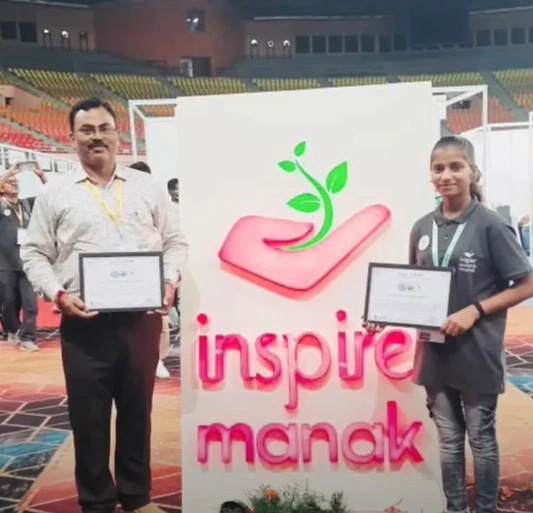

Pooja with her teacher and mentor of INSPIRE -MANAK | Image Credit: BBC
In 2023, Pooja Pal’s invention was chosen from among thousands of entries across India. Out of 60 national winners, she was the only one from Uttar Pradesh. Her dust-free thresher model was displayed at the National Science Exhibition in 2024, earning acclaim for its low-cost, high-impact design. The Ministry of Science and Technology is now working to patent her model which is a rare honour for a rural student.
Trip to Japan
The real surprise came in 2025, when Pooja got selected for the Sakura Science High School Programme in Japan. It’s a prestigious initiative by the Japan Science and Technology Agency (JST) that brings together top science students from around the world for a week of immersive learning and cultural exchange.
Out of thousands of nominees from India, only 54 students were selected. Pooja was the only one from Uttar Pradesh.
Apart from attending science activities, the students were also taken on a trip to Tokyo. For Pooja, it was an unforgettable experience. “Since it was raining, each one of us had an umbrella waiting for us in the bus. We took those when we got down,” she says, fondly remembering the trip, and especially the bus driver who treated the children with kindness. “Everything was so organized, so respectful. It felt special.”
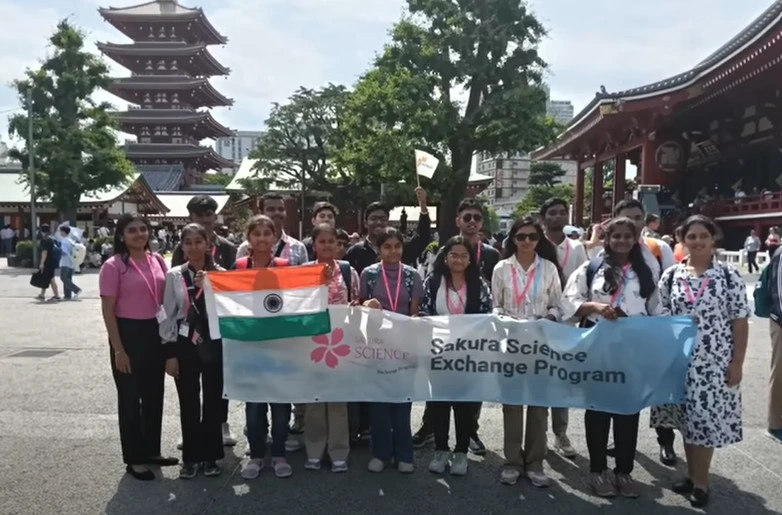

Pooja in Japan with fellow participants of Sakura Science Exchange Program | Image Credit: BBC
Bigger dreams, grounded hopes
Now back in her village and preparing for her Class 12 exams, Pooja is already thinking ahead.
“After I pass 12th, I want to start a small business,” she says. “That way, I can pay for my own college education and help my parents financially.” But her dreams go far beyond survival. “I want to become big enough so that the people who once looked down upon us see our true potential,” she adds with confidence.
Pooja still faces the same village dynamics, the same everyday hurdles. But now, she walks with purpose, and carries the confidence of someone whose innovation has crossed oceans.
ALSO READ: Young innovator, big impact: Tanishka Aglave’s fight against crop disease

